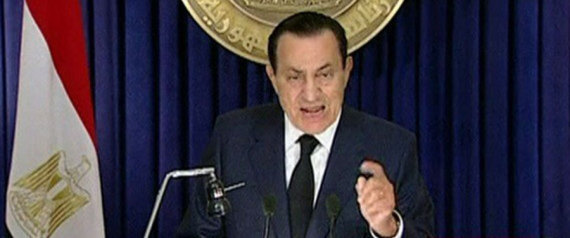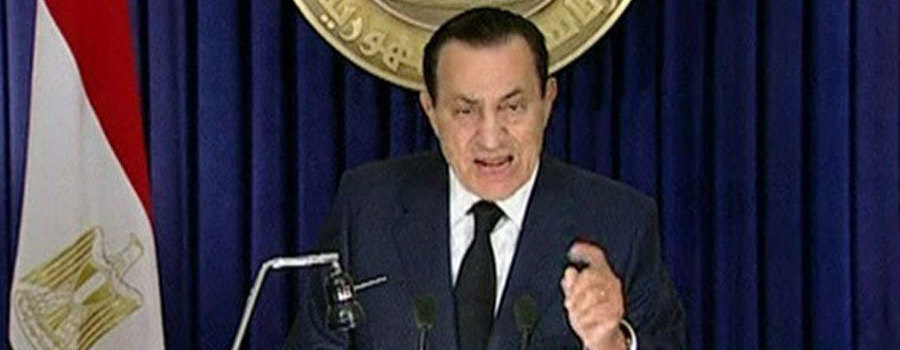
The dramatic announcement showed that the military was taking control after 17 days of protests demanding Mubarak’s immediate ouster spiraled out of control.
Gen. Hassan al-Roueini, military commander for the Cairo area, told thousands of protesters in central Tahrir Square, “All your demands will be met today.” Some in the crowd held up their hands in V-for-victory signs, shouting “the people want the end of the regime” and “Allahu akbar,” or “God is great,” a victory cry used by secular and religious people alike.
The military’s supreme council was meeting Thursday, without the commander in chief Mubarak, and announced on state TV its “support of the legitimate demands of the people.” A spokesman read a statement that the council was in permanent session to explore “what measures and arrangements could be made to safeguard the nation, its achievements and the ambitions of its great people.”
The statement was labeled “communique number 1,” a phrasing that suggests a military coup.
The AFP reports:Badrawi did not specify that he was referring to Mubarak stepping down, but a senior military officer, speaking on condition of anonymity, told AFP: “We are awaiting orders that will make the people happy.”Channel Four has this interview with Hossam Badrawy, the recently appointed secretary general of the ruling party, saying that expects President mubarak to “make a move probably tonight” and “transmit his authorities as president to his vice president.”
Dr Badrawi told International Editor Lindsey Hilsum that President Mubarak had reluctantly come to his decision and now recognises it is time to change. “He sees himself as someone who served his country,” he said. “He made mistakes but he sees himself as someone that does not deserve getting out of power, of his service, that way. At the same time he realises that it’s the time to change. That’s my impression in the last two days.”

Mubarak Won’t Step Down: ‘I Will Not Accept Foreign Interventions’
Egyptian president Hosni Mubarak rejected calls that he step down immediately, saying in a speech today that he “will not accept foreign interventions” and insisting that a national dialogue has been started on how best to execute a transfer of power.
“I am speaking to all Egyptians in Tahrir and beyond,” Muabark begins. He mentions the “martyrs and injured” will not be forgotten and that those who are responsible will be punished. “Your demands are legitimate and just demands,” he adds.
“I will never accept ‘foreign’ dictations,” he said.
He said that he will not run for president in September as he promised, but that he will continue the oath of his office. He says that he will “continue to shoulder” his responsibilities and will work for a peaceful transition of power.
He says confidence needs to be restored, and points out that the protests have affected the economy.
“It’s not about me, it’s not about Hosni Mubarak. It’s about Egypt,” he added.
I have spent my life defending this country, witnessed its wars, lived through its defeat, and victories. I have faced death several times.
Mubarak says he will transfer powers to Vice President Omar Suleiman.
Tahrir Square is erupting into chants of “Leave, Leave, Leave”

Mubarak Refuses To Leave.. Powers Passed To VP Suleiman.. Crowds Erupt In Fury.. Chants Of ‘Leave, Leave’
CAIRO — Egypt’s Hosni Mubarak refused to step down or leave the country and instead said he would hand his powers to his vice president Thursday, remaining president and ensuring regime control over the reform process. Stunned protesters in central Cairo who demand his ouster waved their shoes in contempt and shouted, “Leave, leave, leave.”
The rapidly moving events raised the question of whether a rift had opened between Mubarak and the military command. Hours earlier, a council of the military’s top generals announced it had stepped in to secure the country, and a senior commander announced to protesters in Tahrir Square that all their demands would soon be met, raising cries of victory that Mubarak was on his way out.
After Mubarak’s speech, protest organizers called for the army to take action to oust him, and they vowed increased protests on Friday. Several hundred thousand had packed into Tahrir Square, ecstatic with expectation that Mubarak would announce his resignation in his nighttime address. Instead, they watched in shocked silence as he spoke, slapping their foreheads in anger and disbelief. Some broke into tears.
Around a 1,000 marched on the state television headquarters several blocks away, guarded by the military with barbed wire and tanks. “They are the liars,” the crowd shouted, pointing at the building, chanting, “We won’t leave, they will leave.”
Prominent reform advocate, Nobel Peace laureate Mohamed ElBaradei, whose supporters were among the organizers of the 17-day-old wave of protests, issued a Tweet calling on the military to act.
“The army must save the country now,” he said. “I call on the Egyptian army to immediately interfere to rescue Egypt. The credibility of the army is on the line.”
Immediately after Mubarak’s speech, Vice President Omar Suleiman called on the protesters to “go home” and asked Egyptians to “unite and look to the future.”
In his 17-minute speech on state TV, Mubarak spoke as if he were still in charge, saying he was “adamant to continue to shoulder my responsibility to protect the constitution and safeguard the interests of the people.” He vowed that he would remain in the country and said he was addressing the youth in Tahrir as “the president of the republic.”
“I saw fit to delegate the authorities of the president to the vice president, as dictated in the constitution,” said Mubarak, who looked frail but spoke in a determined, almost defiant voice.
Suleiman was already leading the regime’s efforts to deal with the crisis. The constitution allows the president to transfer his powers if he is unable to carry out his duties “due to any temporary obstacle,” but it does not mean his resignation. Even in that case, the vice president still cannot request constitutional amendments or dissolve parliament.










































